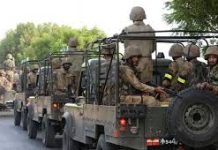
By: Dr. Roxolana Zigón
(www.thenewslark.com)
A BULLET-PROOF GROUND: PAKISTAN IS NOT GUILTY
Since a terrorist attack at Baisaran Valley near Pahalgam in the Anantnag district of Indian-administered Jammu and Kashmir blasted a fragile twilight zone between war and peace on the 22nd of April 2025 and took away the lives of 26 tourists, there has been not a single arrow of accusation that was not piercing the back of Pakistan, torn apart by terrorist attacks for decades.
India and Pakistan are no ordinary neighbors, no ordinary nations that do not cherish their history and roots, as well as the South Asia is no ordinary region but a blood-vascular system of the emerging world order. While getting closer to the red lines of the war conflict between two nuclear states there should be only one reigning thought in the minds of the decision-makers: no more blood must be shed on the altar of war between India and Pakistan as the waters of the Himalayas rivers drift and equally feed both countries and its people.
India should heed the voice of reason and revoke the suspension of the Indus Waters Treaty (IWT), signed between India and Pakistan in 1960, as this is an illegal act that may lead to the dangerous consequences. There is no provision for unilateral exit in the treaty. Moreover, it indicates India’s disrespect for international treaties and supports a negative global trend of demolishing the very basics of the international system and its institutions. Pakistan is an agrarian economy and any threat to the water supply is considered as a direct attack on the people of Pakistan and an economic terrorism. By taking water from Pakistanis today it can turn out into taking clean air from the Indians tomorrow. The starting point of preventing this scenario is to take as unquestionable bullet-proof ground that Pakistan is not guilty in the terrorist incident in Pahalgam and is not a breeder of terrorism.

Pakistan condemns terrorism and is itself a victim of this plague since achieving independence from the British rule in 1947. More than 70 000 Pakistanis were killed in fighting terror during last two decades, and nobody knows the pain and agony of losing innocent civilians than Pakistan. Its policy of ‘zero tolerance for terrorism’ has been always at the core of the political mindset of Pakistan. It allowed to successfully dismantle the networks of the terrorists on its territory and dispel the myth that Pakistan is not capable to control the terrorist movements and organizations on its territory. In the meantime, India, being a beneficiary of the ‘International focus on terrorism,’ especially in the aftermath of 9/11, seemed to glorify and even celebrate terrorism in Pakistan. It marginalized Kashmiris despite their decades long struggle for right of self-determination (as endorsed by the UN Security Council resolutions).
A massive hysteria of the Indian media, flied into a tantrum after a Pahalgam attack, and a stretched iron fist of the Prime Minister Narendra Modi towards Pakistan, created a strong incentive to give a critical assessment of his foreign policy that uses terrorism as an engine for achieving its strategic goals. It has a history of using such ‘incidents’ in order to introduce oppressive legal regimes (revocation of the Article 370 and 35b post Pulwama, and a recent suspension of the Indus Waters Treaty post Pahalgam terrorist attack).
REASONING INDIA FIRST
If India wishes to preserve its national pride and dignity, it should have stopped looking for the easy solutions in order to hide its strategic failures, victimizing itself and obsessively stigmatizing Pakistan as a ‘terrorist’ state, shamelessly maneuvering between the interests of the global players.
In this context India should rather think about securing its reasoning before rushing into securing its land and control over territories in Kashmir. You can win a war only if you succeed to avoid it. Striving for the leadership at the dawn of the new world order emergence, India is to move as carefully and thoughtfully as a climber that stands in front of the most challenging mountain passes ever experienced. Otherwise, there is a strong risk to lose the title of the privileged leader before its official announcement.
THE SHADOWS BEHIND THE SCENE
Evidently, there is a strong interest of the new grand narrative architects to shove the climber from the mountain (India), to сhoke the life, economic and military forces of its rivalry (Pakistan), and to trim the tail of the dragon in the South Asia region (China). To tame three sources of power by the sound of a single-pipe flageolet. The final objective of this scenario is to deprave the very ground of the multipolarity and any alternative to the new form of the global dominance and technofeudal dictatorship. Being enlightened with this knowledge, the desire to enter this masterfully orchestrated trap and to accuse Pakistan for giving permanent birth to the terrorists under all kind of coverings and shades, should radically melt away.
DIPLOMATIC ACES OF RUSSIA
Russia can play an important role of changing a scenario of the play by implementing an independent ground of critical assessment of the inflamed ties between India and Pakistan.It may effectively coin its diplomatic aces by giving a lifting elbow to Pakistan in its international efforts to get rid of the wicked stigmatization of a “terrorist” state applied on it by India, as well as to cool down India that has been enjoying a privileged strategic partnership with Russia for 15 years. The masterhood of reasoning India can sound very straightforward: “If you start a war with Pakistan and ruin the strategic stability in the region, it will be overviewed as the loss of the “privileged leadership” position at the cutting edge of the new multipolar world order emergence.”
THE GAME IS AFOOT?
India launched “Operation Sindoor” in the early hours of Wednesday morning 7th of May in both Pakistan and Pakistan-administered Kashmir. It carried out 15 missile strikes on Kotli, Bahwalpur and Muzaffarabad in the disputed Kashmir region. In return, Pakistan has responded to the aggression, had shot down five Indian aircrafts and vowed to retaliate in the worst clash in more than two decades between the nuclear-armed neighbors.
By provoking an escalation of the conflict, India has been crossing the Rubicon that made the voice of reason sound weaker and less convincing for all the international observers. That weakness will make the military trumpets diminish any diplomatic efforts driven towards peace between two warring states. The stakes are too high, and the threat of nuclear conflict increases every day of unrealized diplomatic will. It cannot help Russia prompting to demonstrate its diplomatic aces in a complex strategic alignment of cards and interests.
In the current diplomatic game of Russia, the “Sofia rule” can be applied that will allow the conflicting parties to end in a tie. However, at the moment, the lack of the chess figures on the board makes a chance to win for one or another side rather impossible. That disposition is strategically beneficial for Russia as it expands the horizons of possibilities to strengthen its stabilizing position.
At the end of the day, a contextual, rather than a conventional, winner of the Indo-Pakistan conflict will determine a completely new trajectory of the security system development in the region of South Asia, and emerge as a reliable and visionary partner of Russia. That will be considered as a strategic privilege tested by the hard times and challenges.

























